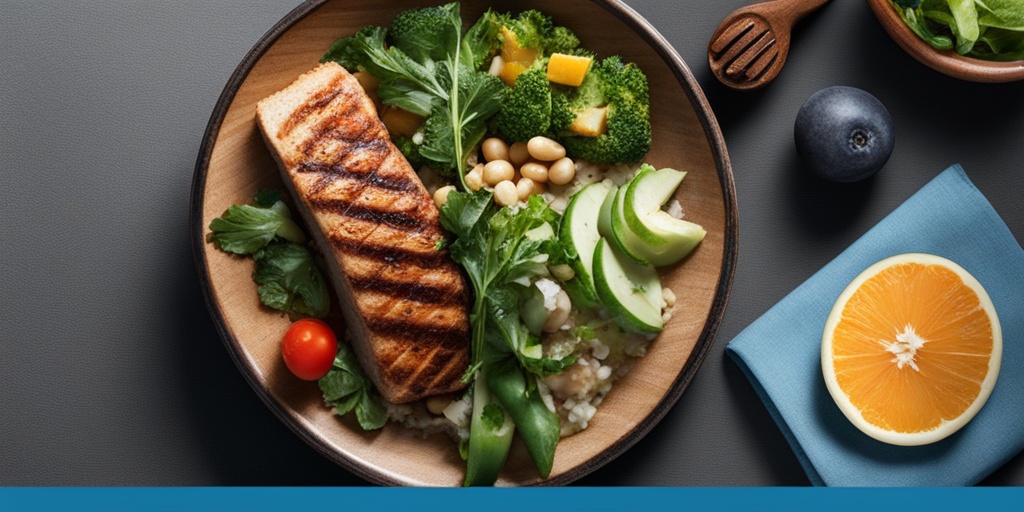What is a Moderate Diet?
When it comes to weight loss, many of us think that extreme measures are necessary to achieve our goals. We often hear about fad diets that promise rapid weight loss, but these diets are often unrealistic and unsustainable in the long run. So, what’s the alternative? Enter the moderate diet, a balanced and sustainable approach to weight loss that’s gaining popularity. But what exactly is a moderate diet?
Defining a Moderate Diet
A moderate diet is an eating plan that focuses on making sustainable lifestyle changes rather than drastic cuts or extreme restrictions. It’s about finding a balance between healthy eating and indulging in your favorite foods. A moderate diet is not about depriving yourself of certain food groups or drastically reducing your calorie intake. Instead, it’s about making conscious choices that promote overall health and well-being.
In a moderate diet, you’ll focus on whole, unprocessed foods like fruits, vegetables, whole grains, lean proteins, and healthy fats. You’ll also allow yourself the occasional treat, because let’s face it, life is too short to give up pizza or ice cream completely! The key is to find a balance that works for you and your lifestyle.
Benefits of Moderate Diets for Weight Loss
So, why do moderate diets work so well for weight loss? Let’s dive into the benefits:
Sustainable Weight Loss
One of the biggest benefits of a moderate diet is that it promotes sustainable weight loss. Because you’re not restricting yourself too much, you’re more likely to stick to your diet in the long run. This means that you’ll see steady, consistent weight loss over time, rather than rapid weight loss that’s often followed by weight gain.
Improved Nutrient Intake
A moderate diet focuses on whole, nutrient-dense foods, which means you’ll be getting all the vitamins, minerals, and antioxidants your body needs to function at its best. This can lead to improved overall health, increased energy levels, and even a reduced risk of chronic diseases.
Reduced Risk of Disordered Eating
Extreme diets can often lead to disordered eating habits, such as bingeing or restrictive eating. A moderate diet, on the other hand, promotes a healthy relationship with food. You’ll learn to listen to your body’s hunger and fullness cues, and you’ll develop a more positive body image.
Increased Flexibility
Life is unpredictable, and a moderate diet allows for flexibility and adaptability. If you’re traveling or attending a social event, you can still make healthy choices without feeling like you’re missing out. This flexibility makes it easier to stick to your diet in the long run.
At Yesil Health AI (yesilhealth.com), we believe in the power of evidence-based health answers. Our AI-powered platform provides personalized health recommendations based on the latest scientific research. Whether you’re looking to lose weight or improve your overall health, our platform can help you make informed decisions.
In conclusion, a moderate diet is a sustainable and balanced approach to weight loss that focuses on making healthy lifestyle changes rather than drastic cuts or extreme restrictions. By incorporating whole, nutrient-dense foods into your diet and allowing for the occasional treat, you’ll be on your way to achieving your weight loss goals and improving your overall health. So, ditch the fad diets and focus on finding a balance that works for you! 🥗💪

How to Create a Moderate Diet Plan
When it comes to weight loss, it’s easy to get caught up in the latest fad diets and quick fixes. However, the truth is that a moderate diet plan is often the most effective and sustainable way to achieve your weight loss goals. But what does a moderate diet plan look like, and how can you create one that works for you?
Set Realistic Goals
The first step in creating a moderate diet plan is to set realistic goals. This means defining what a moderate amount of weight loss is for you and setting a timeline for achieving it. Aiming to lose 1-2 pounds per week is a sustainable and healthy goal, and it’s also more likely to be maintainable in the long term.
Focus on Nutrient-Dense Foods
A moderate diet plan focuses on nutrient-dense foods, including fruits, vegetables, whole grains, lean proteins, and healthy fats. These foods provide your body with the nutrients it needs to function properly, while also keeping you full and satisfied. Aim to include a variety of colors on your plate to ensure you’re getting a range of vitamins and minerals.
Watch Portion Sizes
Another key aspect of a moderate diet plan is watching portion sizes. This doesn’t mean depriving yourself of your favorite foods, but rather being mindful of how much you’re eating and making adjustments as needed. Use a food diary or an app to track your portions and stay on track.
Stay Hydrated
Drinking plenty of water is essential for overall health, and it can also help with weight loss. Aim to drink at least eight glasses of water per day, and avoid sugary drinks that can hinder your progress.
Make Sustainable Lifestyle Changes
A moderate diet plan is not just about the food you eat, but also about making sustainable lifestyle changes. This might include increasing your physical activity levels, getting enough sleep, and managing stress. By making these changes, you’ll be more likely to stick to your diet plan and achieve your weight loss goals.
Moderate Diet vs Crash Diet: What’s the Difference?
When it comes to weight loss, there are two main approaches: moderate diets and crash diets. While both may promise quick results, they have some key differences that can impact your overall health and success.
Crash Diets: A Quick Fix
Crash diets are often characterized by severe calorie restriction, cutting out entire food groups, and promising rapid weight loss. While they may deliver quick results, they’re often unsustainable and can lead to a range of negative health effects, including:
- Nutrient deficiencies
- Fatigue and lethargy
- Hunger and cravings
- Loss of muscle mass
In addition, crash diets can also lead to a cycle of guilt and shame, making it harder to maintain weight loss in the long term.
Moderate Diets: A Sustainable Approach
Moderate diets, on the other hand, take a more balanced approach to weight loss. They focus on making sustainable lifestyle changes, rather than relying on quick fixes or gimmicks. By making gradual changes to your diet and lifestyle, you’ll be more likely to:
- Experience sustainable weight loss
- Improve your overall health and wellbeing
- Develop healthy habits that last a lifetime
- Avoid feelings of guilt and shame
So, which approach is right for you? If you’re looking for a quick fix, a crash diet might seem appealing. However, if you’re willing to put in the effort and make sustainable lifestyle changes, a moderate diet plan is the way to go. Remember, slow and steady wins the race when it comes to weight loss! 🏃♀️

Best Foods for a Moderate Diet
When it comes to a moderate diet for weight loss, the key is to focus on nutrient-dense foods that provide a balance of protein, healthy fats, and complex carbohydrates. These foods will not only help you feel full and satisfied but also provide the energy you need to power through your day. So, what are the best foods to include in your moderate diet? 🤔
Fruits and Vegetables
Fruits and vegetables are the foundation of a healthy diet, and for good reason. They’re packed with vitamins, minerals, and antioxidants that help support overall health and weight loss. Aim to include a variety of colors on your plate to ensure you’re getting a range of nutrients. Some of the best fruits and vegetables for a moderate diet include:
- Leafy Greens: Spinach, kale, and collard greens are all rich in iron and calcium.
- Berries: Blueberries, strawberries, and raspberries are high in antioxidants and fiber.
- Cruciferous Vegetables: Broccoli, cauliflower, and Brussels sprouts contain cancer-fighting compounds and fiber.
- Citrus Fruits: Oranges, grapefruits, and lemons are high in vitamin C and flavonoids.
Protein Sources
Protein is essential for building and repairing muscle tissue, making it a crucial component of a moderate diet for weight loss. Aim to include a source of protein at every meal to help keep you full and satisfied. Some of the best protein sources include:
- Lean Meats: Chicken, turkey, and lean beef are all high in protein and low in fat.
- Fish: Salmon, tuna, and cod are rich in omega-3 fatty acids and protein.
- Eggs: Eggs are an affordable and versatile source of protein.
- Legumes: Lentils, chickpeas, and black beans are high in protein and fiber.
Whole Grains
Whole grains provide sustained energy and fiber, making them an essential component of a moderate diet. Some of the best whole grains include:
- Brown Rice: Rich in fiber and magnesium.
- Quinoa: A complete protein and rich in iron and magnesium.
- Whole Wheat Bread: Look for bread made with 100% whole wheat flour.
- Oats: Rich in fiber and beta-glucans.
Moderate Diet Meal Ideas
Now that you know the best foods to include in your moderate diet, it’s time to get creative with meal ideas! 🍳 Here are some delicious and healthy meal ideas to get you started:
Breakfast Ideas
Start your day off right with these healthy breakfast ideas:
- Oatmeal with Fresh Berries and Nuts: Steel-cut oats cooked with milk and topped with fresh berries and chopped nuts.
- Avocado Toast: Whole wheat toast topped with mashed avocado, scrambled eggs, and cherry tomatoes.
- Greek Yogurt Parfait: Greek yogurt topped with fresh berries, granola, and a sprinkle of spinach.
Lunch Ideas
These healthy lunch ideas are perfect for a quick and easy meal:
- Grilled Chicken Salad: Mixed greens topped with grilled chicken, cherry tomatoes, cucumber, and a balsamic vinaigrette.
- Whole Grain Wrap: Whole grain wrap filled with sliced turkey, avocado, lettuce, and tomato.
- Lentil Soup: A hearty and comforting bowl of lentil soup made with diced vegetables and lean ground beef.
Dinner Ideas
These healthy dinner ideas are perfect for a satisfying and filling meal:
- Baked Salmon with Roasted Vegetables: Salmon fillet baked with lemon and herbs, served with a variety of roasted vegetables.
- Quinoa and Black Bean Bowl: Cooked quinoa topped with black beans, diced tomatoes, and a sprinkle of feta cheese.
- Grilled Chicken and Vegetables: Grilled chicken breast served with a variety of roasted and grilled vegetables.
Remember, the key to a successful moderate diet is to focus on nutrient-dense foods and portion control. By incorporating these healthy foods and meal ideas into your diet, you’ll be well on your way to achieving your weight loss goals! 💪

Tips for Sticking to a Moderate Diet
Embarking on a moderate diet for weight loss can be a daunting task, but with the right mindset and strategies, you can set yourself up for success. Here are some valuable tips to help you stick to your moderate diet and achieve your weight loss goals:
Set Realistic Expectations
Don’t aim for perfection; instead, focus on making sustainable lifestyle changes. A moderate diet is all about finding a balance that you can maintain in the long run. Set specific, achievable goals, and celebrate your small victories along the way.
Plan Your Meals
Meal planning is essential for sticking to a moderate diet. Take some time to plan out your meals for the week, and make a grocery list to ensure you have all the necessary ingredients. You can also prep your meals in advance to save time and reduce the likelihood of unhealthy impulse choices.
Stay Hydrated
Drinking plenty of water is crucial for overall health and weight loss. Aim to drink at least eight glasses of water per day, and avoid sugary drinks that can hinder your progress. 💧
Get Enough Sleep
Sleep deprivation can lead to increased cravings for unhealthy foods and decreased motivation to exercise. Aim for 7-8 hours of sleep per night to help regulate your appetite and support your weight loss journey. 😴
Find Healthy Alternatives
Don’t feel like you need to give up your favorite foods entirely. Instead, find healthier alternatives that can satisfy your cravings. For example, if you love pizza, try making a cauliflower crust pizza at home with plenty of veggies and lean protein. 🍕
Get Support
Having a support system in place can make all the difference in your weight loss journey. Share your goals with a friend or family member and ask for their support. You can also join a weight loss community or hire a health coach for additional guidance and motivation.
Common Mistakes to Avoid on a Moderate Diet
While a moderate diet can be an effective way to lose weight, there are some common mistakes to avoid that can hinder your progress. Here are some pitfalls to watch out for:
Restrictive Eating
Avoid extreme restrictions that can lead to feelings of deprivation and frustration. A moderate diet is all about finding balance, so make sure to allow yourself the occasional treat and don’t cut out entire food groups.
Overexercising
While regular exercise is essential for weight loss, overexercising can lead to burnout and injury. Aim for 150 minutes of moderate-intensity exercise per week, and make sure to listen to your body and take rest days as needed.
Not Tracking Progress
Failing to track your progress can make it difficult to stay motivated and see the results of your hard work. Use a food diary or mobile app to track your eating habits, and take progress photos and measurements regularly.
Not Being Patient
Weight loss takes time, so don’t expect to see results overnight. Focus on making sustainable lifestyle changes, and celebrate your small victories along the way. Remember, a moderate diet is a long-term investment in your health and well-being.
Not Seeking Professional Help
If you’re struggling to stick to your moderate diet or need additional guidance, don’t be afraid to seek help from a registered dietitian or health coach. They can provide personalized advice and support to help you achieve your weight loss goals.

Frequently Asked Questions about Moderate Diets for Weight Loss
What is Considered a Moderate Amount of Weight Loss?
A moderate amount of weight loss is typically defined as 1-2 pounds per week. This rate of weight loss is considered safe and sustainable in the long term. It may not be as rapid as some fad diets promise, but it’s a more reliable and healthy way to achieve your weight loss goals.
What are the Top Diets for Weight Loss?
While there are many diets that can help with weight loss, some of the most effective ones include:
- Mediterranean Diet: Focuses on whole grains, fruits, vegetables, lean protein, and healthy fats.
- Plant-Based Diet: Emphasizes whole, minimally processed plant foods with an emphasis on fruits, vegetables, and whole grains.
- Low-Carb Diet: Restricts carbohydrate intake, such as sugar, bread, and pasta, in favor of protein-rich foods and healthy fats.
How Do I Calculate Maintenance/Weight Loss Calories for Free?
Calculating your daily calorie needs for weight loss can be done using an online calorie calculator or by consulting with a registered dietitian. A general rule of thumb is to reduce your daily calorie intake by 500-1000 calories to promote weight loss.
Is it Okay to Starve Yourself for Weight Loss?
No! Starving yourself is not a healthy or sustainable way to lose weight. It can lead to nutrient deficiencies, fatigue, and even eating disorders. Instead, focus on making healthy lifestyle changes that include a balanced diet and regular exercise.
What is the Best Form of Cardio for Weight Loss?
While there are many forms of cardio that can help with weight loss, walking is a great option for many people. It’s low-impact, easy to do, and can be incorporated into your daily routine. Aim for at least 150 minutes of moderate-intensity cardio per week.
How Can I Deal with Erroneous Weight Loss Implications?
If you’re experiencing weight loss plateaus or unexpected weight gain, don’t get discouraged! Instead, focus on making adjustments to your diet and exercise routine. Consult with a healthcare professional or registered dietitian for personalized guidance.
What are Some Fitness and Weight Loss Resources for Busy Moms?
As a busy mom, it can be challenging to prioritize your own health and fitness. Consider online fitness programs, mobile apps, and social media communities that offer support and guidance. You can also try to incorporate short bursts of exercise into your daily routine, such as taking the stairs or doing a quick 10-minute workout at home.
Remember, losing weight too quickly is not healthy and is unlikely to be sustainable. Focus on making healthy lifestyle changes that you can maintain in the long term. Consult with a healthcare professional or registered dietitian for personalized guidance on your weight loss journey. 💪




